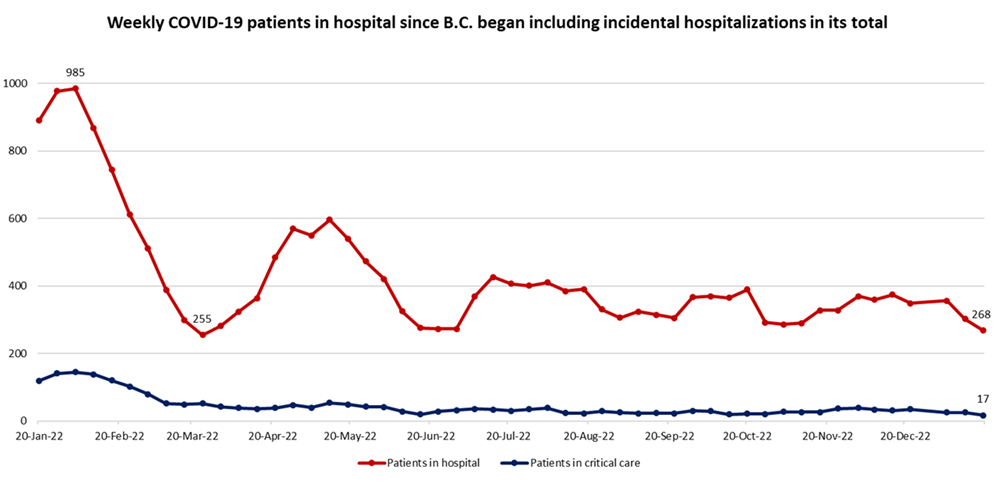COVID-19 cases in B.C. hospitals decline to lowest level in almost 11 months
 Courtesy: Shutterstock.
Courtesy: Shutterstock.
The number of patients in B.C. hospitals with COVID-19 has reached its lowest level in nearly 11 months, according to data released Thursday by the B.C. Centre for Disease Control.
There were 268 test-positive patients hospitalized in the province as of Thursday, the lowest number B.C. has seen on a Thursday since March 24, 2022, when there were 255 people in hospital with the coronavirus.
It's also the lowest weekly total the BCCDC has reported since it switched to weekly updates on COVID-19 data in early April of 2022.
 A trendline of the number of patients in B.C. hospitals with COVID-19 on Thursdays since the province switched to a "hospital census" model in January 2022 shows the highest, lowest and current numbers. (CTV)
A trendline of the number of patients in B.C. hospitals with COVID-19 on Thursdays since the province switched to a "hospital census" model in January 2022 shows the highest, lowest and current numbers. (CTV)
Since January 2022, the province has been including "incidental" hospitalizations in its COVID-19 data. That means the numbers in the graph show both patients who were seriously ill with COVID-19 and required medical care and patients who were admitted to the hospital for other reasons and tested positive for the disease once they got there.
Shortly after the switch to this "hospital census" model, the province hit its highest-ever Thursday total for hospitalizations, reaching 985 on Feb. 3, 2022. The 255 reported on March 24 was the lowest-ever total.
According to health officials, between 40 and 50 per cent of COVID-19 patients reported each week are in hospital because of the disease, while the rest tested positive incidentally after being hospitalized for other reasons.
HOSPITALS STILL STRUGGLING
The decline in COVID-19 patients in B.C. hospitals comes despite continued high levels of hospital use across the province, overall.
Health Minister Adrian Dix and provincial health officer Dr. Bonnie Henry have framed the challenges facing the health-care system as difficult, but not unexpected, saying hospitalizations always rise in January.
Still, the province reopened emergency operations centres at 20 hospitals earlier this month, and the facilities continue to operate above their typical capacity, excluding surge beds.
As of last Friday, there were 10,106 people hospitalized for all causes across the province. Including 2,500 surge beds, there are 11,680 total hospital beds in B.C. That means 87 per cent of all beds in the province were full at the end of last week, with hospitals operating at 110 per cent of their baseline capacity.
The strain of a difficult respiratory illness season coupled with the lingering effects of the pandemic led many health-care workers to contact CTV News to express frustration with provincial leadership, and to claim they fear retribution from their employers if they speak about their concerns publicly.
NO 'KRAKEN' SURGE YET
While the XBB.1.5 subvariant of the Omicron lineage of SARS-CoV-2 has caused surges in other parts of the world, the available data in B.C. has not yet shown a similar pattern.
Alongside the decline in the hospital census, this week's BCCDC data shows a lower number of cases detected through lab testing and declines in coronavirus concentrations in wastewater at some Lower Mainland plants.
Further, the plants where concentrations are still increasing have all seen the rate of increase slow down in recent weeks.
Last week, Henry made note of this trend as she and Dix provided an update on respiratory illness season.
The provincial health officer said B.C.'s whole-genome sequencing efforts had detected a total of 24 instances of the XBB.1.5 subvariant, dubbed the "Kraken" variant by some.
While there are certainly more than 24 cases of the variant in the province, it accounted for less than five per cent of the genomes sequenced in B.C. as of last week, according to Henry, who also sought to allay any fears people may have about XBB.1.5.
"Any new variant that has an advantage spreads more easily," she said. "That's what viruses do. They change to try and reproduce themselves more quickly. And if it spreads more easily, it often will replace the ones that went before it. So each new one that spreads, by definition, is the most infectious one to date."
"We must remember that these new strains may make us more vulnerable to infection, but they don't render us defenceless," Henry added, noting that B.C. has a high level of protection from vaccination and infection with other strains of Omicron.
Precautions like staying home when sick, wearing a mask in crowded spaces and places with poor ventilation, and – most importantly – keeping up with vaccinations, will help tame the Kraken variant, too, Henry said.
VACCINATION DATA
The provincial health officer described immunization with the Omicron-targeting bivalent vaccines as the most important protective measure people can take.
According to the BCCDC, 30,731 new COVID-19 vaccine doses were administered in the province during the week that ended Jan. 14.
The largest share of those are classified as either fourth (12,799) or fifth (9,276) doses on the BCCDC's COVID-19 dashboard, meaning they were administered to people who had already had at least one booster shot before the bivalent vaccines became available.
CTVNews.ca Top Stories

B.C. tenants evicted for landlord's use after refusing large rent increase to take over neighbouring suite
Ashley Dickey and her mother rented part of the same Coquitlam duplex in three different decades under three different landlords.
MPP Sarah Jama asked to leave Ontario legislature for wearing keffiyeh
MPP Sarah Jama was asked to leave the Legislative Assembly of Ontario by House Speaker Ted Arnott on Thursday for wearing a keffiyeh, a garment which has been banned at Queen’s Park.
Mountain guide dies after falling into a crevasse in Banff National Park
A man who fell into a crevasse while leading a backcountry ski group deep in the Canadian Rockies has died.
Expert warns of food consumption habits amid rising prices
A new survey by Dalhousie University's Agri-Food Analytics Lab asked Canadians about their food consumption habits amid rising prices.
Here's why provinces aren't following Saskatchewan's lead on the carbon tax home heating fight
After Prime Minister Justin Trudeau said the federal government would still send Canada Carbon Rebate cheques to Saskatchewan residents, despite Saskatchewan Premier Scott Moe's decision to stop collecting the carbon tax on natural gas or home heating, questions were raised about whether other provinces would follow suit. CTV News reached out across the country and here's what we found out.
Montreal actress calls Weinstein ruling 'discouraging' but not surprising
A Montreal actress, who has previously detailed incidents she had with disgraced Hollywood producer Harvey Weinstein, says a New York Court of Appeals decision overturning his 2020 rape conviction is 'discouraging' but not surprising.
Charlie Woods, son of Tiger, shoots 81 in U.S. Open qualifier
Charlie Woods failed to advance in a U.S. Open local qualifying event Thursday, shooting a 9-over 81 at Legacy Golf & Tennis Club.
Caleb Williams, Jayden Daniels and Drake Maye make it four NFL drafts with quarterbacks going 1-3
Caleb Williams is heading to the Windy City, aiming to become the franchise quarterback Chicago has sought for decades.
Improve balance and build core strength with this exercise
When it comes to cardiovascular fitness, you may tend to focus on activities that move you forward, such as walking, running and cycling.
































